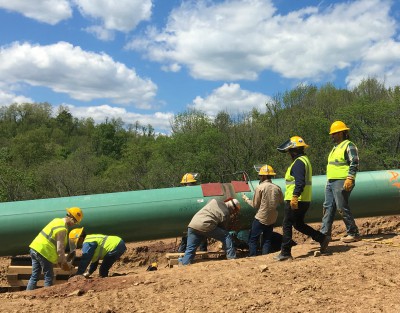Canada's new pipeline parts rules to lessen burden on operators
CALGARY, Alberta (Reuters) — Canada's energy regulator should shift the burden for ensuring quality of oil-and-gas pipeline parts from operators and move it more to manufacturers, according to an official report viewed by Reuters.
 |
| Photo courtesy of TransCanada. |
The National Energy Board (NEB) commissioned the report to improve the equality of pipeline parts after TransCanada Corp and Enbridge Inc discovered that some parts they were using were substandard.
Currently, operators often have to provide additional specifications for parts because standards are too low, placing them at a disadvantage, according to the report, which was provided to Reuters ahead of its public release.
"This creates an uneven playing field where pipeline operators with comprehensive specifications are placed in an uncompetitive position due to higher procurement costs," the report read.
Canada, home to the world's third-largest oil reserves, relies heavily on pipelines, making it imperative for them to be secure.
Policies should be developed "to ensure pipeline-operator quality strategies are transferred to all parties in the supply chain," according to the paper.
While the report's recommendations are not binding, NEB chief engineer Iain Colquhoun told Reuters this week the regulator's push for higher standards for manufacturers will ensure pipeline operators do not need to outline comprehensive additional specifications.
"We'll absolutely level the playing field," he said.
The higher standards would apply to all manufacturers who provide parts to Canadian pipeline operators, including South Korea's TK Corp and Italy's Valvitalia Sp, which had provided some substandard parts to TransCanada and Enbridge, according to the NEB.
TransCanada, which was among companies represented at an NEB workshop last week on quality assurance for pipeline parts, said it will use conclusions from the event to bolster its quality management program.
Enbridge, TK Corp and Valvitalia did not respond to requests for comment.
The Canadian Energy Pipelines Association, which includes TransCanada and Enbridge, said it is possible that manufacturers could still pass on some costs of the higher standards. But operators will not be heavily affected as they can make the money back through the lifecycle of their pipelines, CEPA said.
Colquhoun said possible new measures for quality assurance include more standardization of manufacturing methods and training for certain employees of pipeline operators.
The report recommended changes that also include more disclosures and tracking of materials from manufacturers.
The NEB will decide on detailed measures this year. It could take up to 2023 for changes to be adopted formally by the external standards association, but the regulator will take action if quality assurance issues demand immediate attention, Colquhoun said.
Reporting by Ethan Lou; Editing by Jonathan Oatis and Dan Grebler

- RWE strengthens partnerships with ADNOC and Masdar to enhance energy security in Germany and Europe
- TotalEnergies and Mozambique announce the full restart of the $20-B Mozambique LNG project
- Five energy market trends to track in 2026, the year of the glut
- Venture Global wins LNG arbitration case brought by Spain's Repsol
- Trinity Gas Storage reaches FID on Phase II expansion



Comments